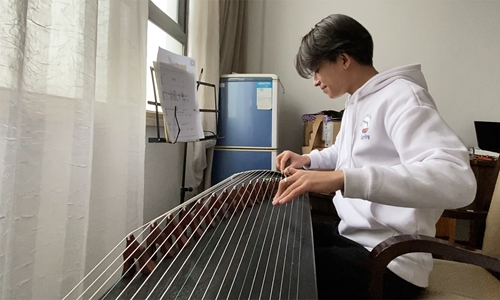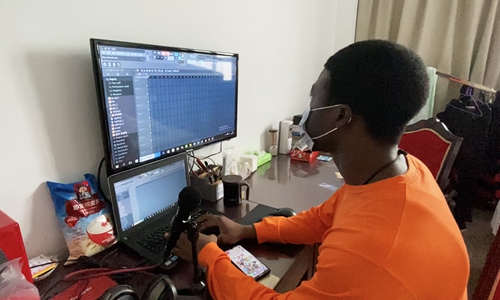HOME >> CHINA,SPECIAL-COVERAGE
Foreign students help spread true voice of China's antivirus efforts
Source:Global Times Published: 2020/2/17 20:37:29

Azim Sultanov plays the Guzheng. Photo: Chen Xia/GT
It was drizzling outside, and a melodious tune of Guzheng reverberated inside a dormitory building close to Shanghai International Studies University (SISU).
Azim Sultanov, 20, Kazakh national currently studying at the SISU, is plucking the Guzheng to the tunes of "A Sound of Laughter in the Vast Sea," the theme song of a martial arts film based on Jin Yong's novel.
Sultanov, a fluent Putonghua speaker is a fan of Chinese music. He didn't expect his winter holiday to pan out this way. Due to the novel coronavirus pneumonia (NCP) outbreak, he spent most of his time in the dormitory, learning Chinese and plucking the Guzheng.
Being a bridge
"As a Chinese language learner, and also a foreigner, I have the responsibility to be a bridge to let people around the world know the truth about the epidemic, as I have read a lot of unreliable news in the foreign media," Sultanov told the Global Times.
He feels such misleading news trigger panic among the people. "I went out yesterday to buy some daily necessities from the market," he said, noting that the Shanghai authorities have done a good job to combat the NCP. "There's no need to panic."
With fewer people and vehicles on the streets, he feels the city is a little different from its usual aura. For instance, Nanjing Road, the famous commercial street, is not as busy as it usually is. "For me, it's a good choice to stay here, as it's risky to take a flight (back home) currently," he said. He regularly speaks to his parents on the phone, and they are assured he is quite safe in the dorm.

Sofiia Semyholovska has her temperature checked when she returns to the dorm. Photo: Chen Xia/GT
Sofiia Semyholovska, 20, from Ukraine is also a student at the SISU who feels sad and at the same time angry when her friends in Ukraine keep asking her "is it ok to speak with Chinese people (due to the virus)?"
"They know I'm in Shanghai and are worried (about me)," Semyholovska told the Global Times. After being flooded with the same questions several times, she took to her 1.5K-following Instagram account and posted her reply.
"I was trying to stop them because they started to share fake news," She noted.
"I said they should stop reading fake news and I recommended them reliable sources," she said. "I told them in China it's safe, and there is temperature screening in airports and railway stations."
She was really happy it worked out. "I really hope the epidemic will end soon," Semyholovska said.
Well-organized measures
Semyholovska's close friend Ornella Malyan, 21, an Uzbek national is also a student in the same university. To ensure their safety on the campus, SISU has adopted effective measures. Anyone who enters or exits the dormitory is mandated to register and get their temperatures screened. In order to reduce the risk of potential exposure to infection outdoors, the two haven't seen each other for several days.

Ornella Malyan at a canteen in campus. Photo: Chen Xia/GT
Malyan told the Global Times she calls her parents every day. In the beginning, her parents were worried, but she insisted to stay here. "I am not in panic, I feel safe here." Malyan hopes to hang out with her friends when the epidemic ends.
After registering related information, these students are allowed to venture out. "They (the university) really care about us," Semyholovska said, adding that if she is out for long hours, the dormitory staff will call her to inquire about her whereabouts and urge her to return soon.
"They (dormitory staff) also give us masks for free," she said.
"We do proper monitoring, including temperature screenings every day to ensure these students are healthy," Xu Bojun, manager of the SISU Hotel, one of the SISU international students' dormitories, told the Global Times. The dormitory currently has 24 international students. The dormitory also puts a box of tissues in the elevators so people can use it when pressing the buttons.

Kpedeti Bedel Gilles Faccio Kpogbozan plays with some musical apps in his room. Photo: Chen Xia/GT
Kpedeti Bedel Gilles Faccio Kpogbozan, 23, from Benin in West Africa has been staying in his dormitory since the epidemic broke out. He told the Global Times he is not in a panic, and just wants to adhere to the safety instructions.
He is a music lover and spends his time recording music and singing songs. He understands he can't go out often. "Don't be afraid. Everything will be ok."
Global Times
Posted in: SOCIETY,FEATURE